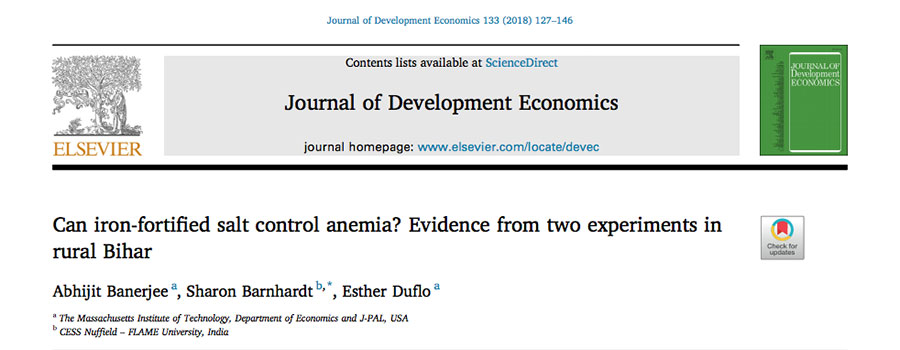Several strategies are available to address the high prevalence of iron-deficiency anemia found across India. The challenge? Getting people to eat iron-fortified or iron-rich foods or to take iron supplements.
Dr. Sharon Barnhardt, Director of CESS Nuffield – FLAME University recently completed a study of the impact of selling and freely distributing salt fortified with iron (and iodine) in 400 villages in Bihar. Cooking food at home with iron-fortified salt should be one of the easier diet changes for people to make to reduce anemia, given that packaged salt is already consumed in villages. However, earlier studies which demonstrated efficacy of the formula were conducted with small special samples like students in hostels and/or with heavy monitoring and reminders. The resulting evidence was insufficient to recommend public policies to promote the product for the general population or without expensive long-term information campaigns.
Barnhardt and her co-authors, Prof.Esther Duflo and Prof. Abhijit Banerjee (both from MIT Economics and J-PAL) designed rigorous experimental research to address two questions. Would households buy iron-fortified salt? Would availability of the product make individuals healthier? They studied more than 39,000 individuals, of which 45% was anemic.
The team found that neither sales nor free distribution of iron-fortified salt had an impact on average anemia rates for the general population. Among pre-defined subgroups (kids, females, the elderly) the impact was the same. These results raise doubt that existing government directives to use iron-fortified salt in school mid-day meals will lead to any health improvements for kids.
Barnhardt and her co-authors will publish the results of their work in the July 2018 issue of the Journal of Development Economics. The peer-reviewed paper is available for free from the journal until 21 April 2018. The research was supported by research grants from the U.K. Department for International Development, the International Initiative for Impact Evaluation (3ie), the U.S. National Institutes of Health, and the International Food Policy Research Institute. Fieldwork was conducted by J-PAL South Asia.



